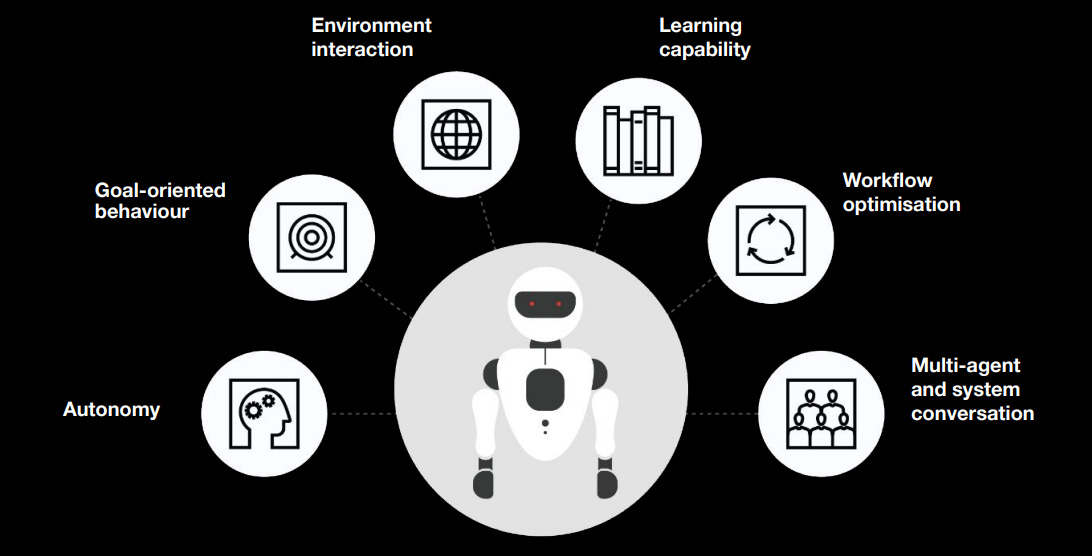Four For Friday | January 3, 2025
LF154 | Building future cities book, Ada Lovelace report on data, visualizing humans' impact, 10 new thoughts on ageing societies + PWC report on Agentic AI.
Welcome to Looking Forward’s Four For Friday. Four things that have piqued my interest this week, together with a bonus: AI Tip of The Week. Enjoy!
Building future cities: book
Springer has released an open access book, Future Cities Making, with the subtitle: ‘Mission-oriented Research for Urban Sustainability Transitions in Australia’.
It compiles a number of essays covering sustainability analysis and case studies of health and environmental transformation efforts in Australian cities, including reviews of renaturing, water management, healthy cities and improving suburban sprawl, a real challenge in Australia.
Chapter 9 makes a good use of the Three Horizon model to explore a just multi-species transition:
The So What? A rich resource for sustainability and health-minded urban innovators.
New Ada Lovelace Institute report on participatory data
The Ada Lovelace Institute's latest landscape report focuses on “participatory and inclusive” data stewardship, recognizing the need to shift power dynamics in data governance. It references the ‘ladder of participation’ suggesting that some current citizen data programs barely get past the level of tokenism, let alone full citizen control.
Its aims to view data as a shared resource, to enhance public trust and community involvement. The goal is foster societal good amidst growing concerns of Big Tech corporate dominance and data privacy.
The So What: The ‘ladder of participation’ is a useful lens through which to review new citizen data programs.
Humans’ breathtaking planetary impact
Fascinating reporting by the NY Times about biocubes, the new visualization of 2018 research showing the what humans have created compared to nature.
The research found that over the past 100 years, humans have created more waste than the 1.1 trillion tonnes of biomass that exists in nature today. The eight billion humans themselves only represent 120m tonnes, just a quarter of the amount for termites, for example.
Of the humans’ output of 1.3 trillion tonnes, 600m is concrete and 400m is sand, gravel and other aggregate material.
The So What? Visual story telling is a big part of narrative shifting. Maybe the fact that we can see wild animals as just one tenth of the mass of humans, or plastic we create as 100x more mass than humans, will shift mindsets.
Rethinking care for aging societies
Some bold ideas by Geoff Mulgan for Demos Helsinki on how we can reorient society to prepare for aging demographics, and reframe this as an opportunity for longer lives for all, not just a burden. A brief synopsis of his 10 key points:
New financial innovations. Societies must creatively restructure financial systems, incentivize preventive care, and connect property assets to care costs for sustainable ageing solutions
Medical Advances without the hype. Maintain medical innovation while addressing diminishing R&D returns; prioritize public health, environmental, and social factors over purely biomedical approaches.
CareTech. Leverage AI, robotics, and digital tools to enhance elderly care while addressing gaps in technology design for older generations.
Care Economy. Elevate care work’s status and pay, recognizing its essential societal role, with innovative models like social prescribing and flat hierarchies.
Care Models. Redefine care to emphasize sociability and self-management; promote environments fostering usefulness, thriving, and positive health rather than disease avoidance.
Time Utilization. Harness freed time from longer lives for community engagement, learning, or hybrid economies like timebanks to enhance societal contributions.
Cities and Homes. Redesign urban spaces and housing for accessibility, flexibility, and mutual support; explore innovative dementia-friendly communities like Hogeweyk.
Mutual Support. Foster social capital through intergenerational projects and policies combating loneliness; invest in R&D for mutual care frameworks and technologies.
Fun in Ageing. Encourage meaningful activities like travel, hobbies, or work to redefine ageing as a time of pleasure, creativity, and purpose.
Mindset Shift. Promote positive attitudes toward ageing; integrate systemic changes in policy and R&D to extend life expectancy and societal well-being.
The So What: Individuals put their head in the sand around aging, but there’s no excuse for governments and policy makers to do the same. We need a vibrant conversation about these ideas and 1000 more to change our society to the new demographic reality.
Bonus - AI Report of the Week
A new report by PWC about Agentic AI. It defines agentic AI as: “AI systems that possess the capacity to make autonomous decisions and take actions to achieve specific goals with limited or no direct human intervention”. It breaks down agentic AI into 6 aspects:
Autonomy: Operate independently.
Goal-oriented behaviour: Pursue specific objectives to achieve desired outcomes.
Environment interaction: Interacts with surroundings and perceive changes.
Learning capability: Machine or reinforcement-learning to improve performance.
Workflow optimisation: Integrate language understanding with reasoning, planning, and decision-making.
Multi-agent and system conversation: Communication between different agents and systems to construct complex workflows and perform tasks.
That’s all for this week. As always, feedback welcome. Feel free to share insights or links of interest.
- Stephen




